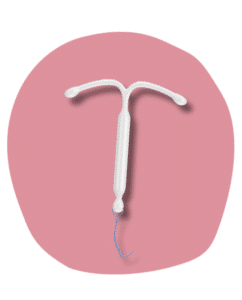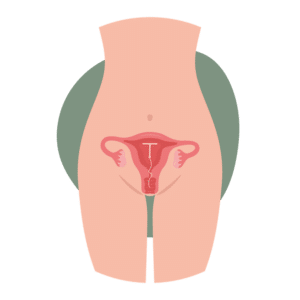
IUD is short for Intrauterine Device, and it’s a tiny plastic device that a trained healthcare provider puts in your uterus. The hormonal IUD is shaped like a T, and it slowly releases a hormone called Levonorgestrel (Progestin) into your body over time. This hormone is pretty similar to the one that our bodies make naturally, called progesterone. If you’re breastfeeding/chestfeeding, you don’t have to worry about your milk supply dropping because this type of IUD doesn’t have any estrogen.
Besides pregnancy prevention, the hormonal IUD can also be your buddy in the battle against painful and heavy periods.
In the U.S., you’ve got four hormonal IUD options: Mirena, Kyleena, Liletta, and Skyla. Here’s the lowdown – they all work in the same way, pumping out a steady dose of levonorgestrel (progestin). The main difference is the amount of hormones and how long they last for pregnancy prevention.
If you are looking to get a hormonal IUD, the first thing you’ll need to do is schedule an appointment with a healthcare provider that does IUD insertions.
The hormonal IUD can be inserted any time of the month. The most comfortable time may be during your period because that’s when your cervix is open the most. Before your appointment, you can take a pain reliever, such as ibuprofen, to help with possible discomfort with insertion and cramps.
After it’s in, there’s really not much you have to do other than check the string ends occasionally to make sure it’s in place.

p.s. Don’t pull on the strings! If you do, the IUD could move out of place.
p.p.s. If you don’t feel comfortable checking for the strings, you can let your provider do that the month after insertion, and then yearly after that.
When it comes to birth control, there are pros and cons for each method, and remember, everyone’s body is unique, so what works for you might not be the same for your friends. Hormonal IUDs are usually pretty safe and well-tolerated, but it’s a good idea to chat with your healthcare provider. They’ll help you figure out if it’s right for you based on your needs, health, and what you prefer.
Perfect for those avoiding estrogen-based methods, including breastfeeding/chestfeeding parents.
IUDs are super effective and convenient for preventing pregnancy, but it’s important to remember that they don’t protect you against sexually transmitted infections (STIs). To reduce the risk of getting or spreading STIs, it’s a good idea to use condoms every time you have sex, even if you have an IUD. We offer condoms mailed directly to anyone who is 18+ and lives or goes to school in our service area. Click here to request free condoms.
If you live or go to school in our 18-county service area and are looking for a birth control method, you can give us a call at 423-265-7837 to schedule an appointment. If you want to speak with one of our Health Educators on the phone or if you’d like for us to call you back on a certain day to schedule an appointment for birth control, you can fill out the request form linked here, and we will call you back on your preferred date.
https://www.acog.org/womens-health/faqs/long-acting-reversible-contraception-iud-and-implant
https://www.womenshealth.gov/a-z-topics/birth-control-methods
https://www.mirena-us.com/about-mirena/side-effects-and-safety
https://www.liletta.com/faqs
https://www.kyleena-us.com/safety-and-side-effects
https://www.skyla-us.com/safety-considerations
© A Step Ahead Chattanooga 2024 and website designed by Brightside Creates.
We collect cookies to analyze our website traffic and performance; we never share any personal data. View our Privacy Policy.